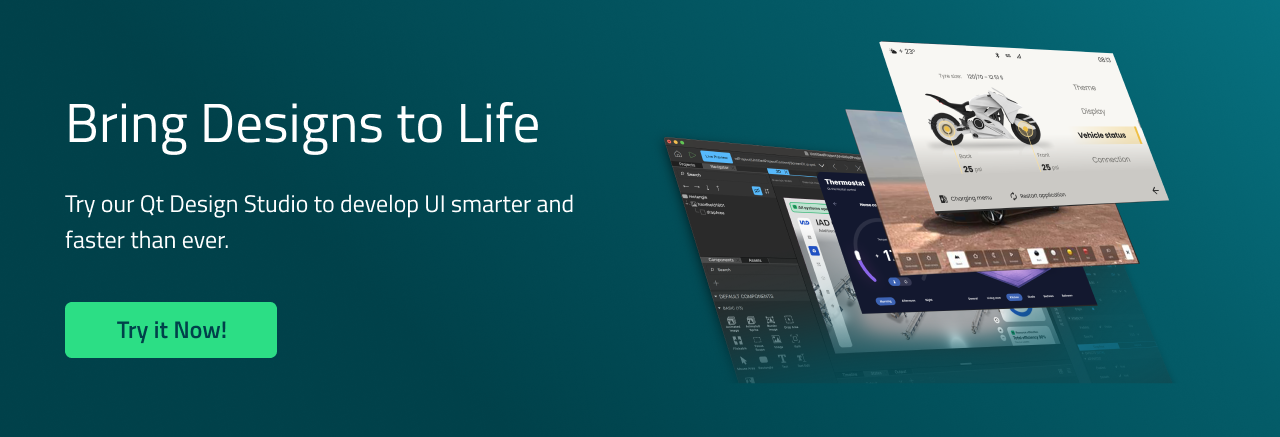Qt Design Studio 4.6 Released
October 01, 2024 by Lussy Kim | Comments
Qt Design Studio 4.6 is here! This month, we present to you an exciting new edition of the Qt Design Studio, further uniting developers and designers. Let's take a deeper look!
Bring your Design System from Figma
Introducing Variable Support
We're excited to announce that Qt Design Studio now supports Figma Variables. You can import the variables table together with the Figma project to transfer all the theming and variant management from Figma to Qt Design Studio. When imported, UI elements will be connected to the design system as property bindings.
Figma’s Variable feature allows designers to centralize and manage their design system elements, making it easy to ensure consistency across projects. The introduction of Figma Variable export in Qt Design Studio means that these well-crafted design systems can now flow directly into development, enabling faster integration of design systems and theming by eliminating the need for manual hardcoding. We will enhance this feature in the upcoming release with a visual editor for the imported design system.
Are you interested? Experience seamless transition with Qt Bridge for Figma in Figma Community. For discover more about the variable support, see the documentation.
Create a Qt for MCUs-friendly UI in Figma
Optimized Export for Microcontroller UI Development
Starting from Qt Design Studio 4.6, you don't need to jump between Figma and Qt Design Studio when creating Qt for MCU-compatible UI projects. You can validate that your Figma project is compatible with the Qt Ultralite (QUL) runtime while you are still in Figma.
The new Qt for MCU export target mode in Qt Bridge for Figma automatically disables unnecessary export options and warns about unsupported elements before and after the export. This ensures that only MCU-compatible assets enter your project, streamlining the workflow for developers targeting microcontroller units. We plan to scrutinize the warnings and guidelines for a smoother user experience in the upcoming releases.
For more information on the Qt for MCU export target mode, check out our FAQ for Qt for MCUs.
Shared 3D Asset Management across Team
Share Assets
Qt Design Studio 4.6 brings you a possibility to share project assets across projects and users. Users now have the option to save them in the Content Library or in their own storage, instead of restricting assets to a single project. This allows assets to be accessible for any other project for the user and can even be shared across a team by sending packed files of exported assets.
This not only simplifies asset management for larger projects but also enhances collaboration by allowing teams to create shared libraries, ensuring consistency across various projects while reducing repetitive work.
More Powerful 3D Workspace
Visual Asset Importer
The Visual Asset Importer takes the guesswork out of integrating 3D models into your project. You can preview your 3D models and configure import settings before integrating them. This reduces time-consuming iterations and ensures that your 3D models fit perfectly immediately.
Principled Material EX
Principled Material Extended (EX) is an advanced new feature that gives users greater control over material creation. With this tool, users can apply multiple material effects as layers within a single component, using masks to achieve complex and dynamic visual effects. Backed by Qt 6.8, this capability unlocks a new level of realism and creativity in 3D UI development, making it easier to craft sophisticated, layered materials without the need for complex workarounds.
Other Improvements
- New Output Pane: We added a new Output Pane with a notification indicator in the status bar for better discoverability. User will be immediately informed whenever there is an issue.
- Export to Python: Now you can also generate the boilerplate code for Python and Pyside. Since version 6.5, PySide will also contain the Studio Components for Qt Design Studio. Learn more about this in the documentation.
- Star and Text Item: We added two new items to the Qt Quick Studio Components: a star item and a text item. The text item finally makes it easy to add gradients and custom borders to text in Qt Design Studio. Please also check out the documentation.
- Bug Fixes: For more detailed information on the update, including small improvements and bug fixes, please visit our change log.
Qt Design Studio 4.6.2 Released
We have implemented several improvements and bug fixes in Qt Design Studio 4.6.2 and Qt Bridge for Figma. This includes enhanced connectivity to the documentation from examples and the output pane. We strongly recommend updating to this latest version for a better overall experience.
See all the changes made in 4.6.2 from the change log.
Getting Started
Qt Design Studio is everything you need for quicker and smarter UI development. Meet our product and try out the free evaluation.
Do you want to learn more about Qt Design Studio? Do not worry.
- Dive into our online documentation to learn about Qt Design Studio.
- Kickstart your journey with Qt Design Studio through our learning portal.
If you encounter any bugs or usability issues, please send us a report in the issue tracker . We always look forward to improving your experience with Qt Design Studio.
Blog Topics:
Comments
Subscribe to our newsletter
Subscribe Newsletter
Try Qt 6.10 Now!
Download the latest release here: www.qt.io/download.
Qt 6.10 is now available, with new features and improvements for application developers and device creators.
We're Hiring
Check out all our open positions here and follow us on Instagram to see what it's like to be #QtPeople.



